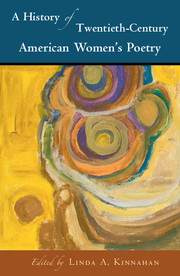Book contents
- Frontmatter
- Contents
- List of figures
- List of contributors
- Preface
- Acknowledgments
- PART I MAPPINGS AND CHRONOLOGIES
- PART II ETHNICITY, RACE, AND IDENTITY
- 5 Native American Women Poets
- 6 Asian American Women Poets
- 7 Chicana/Latina Women Poets
- 8 African American Women Poets
- 9 Jewish American Women Poets
- PART III MATERIAL FORMATIONS
- PART IV LINEAGES, TIES, AND CONNECTIONS
- PART V FORM, LANGUAGE, AND TEXT
- PART VI CODA
- Bibliography
- Index
9 - Jewish American Women Poets
from PART II - ETHNICITY, RACE, AND IDENTITY
Published online by Cambridge University Press: 05 June 2016
- Frontmatter
- Contents
- List of figures
- List of contributors
- Preface
- Acknowledgments
- PART I MAPPINGS AND CHRONOLOGIES
- PART II ETHNICITY, RACE, AND IDENTITY
- 5 Native American Women Poets
- 6 Asian American Women Poets
- 7 Chicana/Latina Women Poets
- 8 African American Women Poets
- 9 Jewish American Women Poets
- PART III MATERIAL FORMATIONS
- PART IV LINEAGES, TIES, AND CONNECTIONS
- PART V FORM, LANGUAGE, AND TEXT
- PART VI CODA
- Bibliography
- Index
Summary
This essay will present a brief history of poetry by Jewish women writing in the United States in the twentieth century. This history is by necessity selective, and its trajectory will be determined by the poets and poems I have chosen to discuss. There are likely other versions of this history, or, indeed, other histories of Jewish American women's poetry in the twentieth century that could be written, and I hope that others will write them. I approach this task by considering the following issues: What language does a poet choose to write in – a Jewish language, such as Yiddish or Hebrew, or the official language of American cultural and public life, English, a language that is in its origins and essence, Christian, as Cynthia Ozick proposed somewhat facetiously in the introduction to her 1976 collection of short stories, Bloodshed and Three Novellas? To what extent does the poet use or avoid traditional Jewish religious imagery, tropes, texts, or forms; or, use or avoid traditional Christian religious imagery, tropes, texts, and forms, in the poems I've selected? To what extent does the poet summon or avoid ethnic Jewish cultural imagery, dialect, or forms? And, finally, to what extent does the poem address questions of gender and Jewishness, and how does the poem embody or reflect them? What is the significance of these questions, and how do they connect this poem and poet to the other poets in the essay?
The story of twentieth century poets begins in the nineteenth century with a poet who wrote in the American vernacular for American synagogues. The first Jewish woman to publish a book of poetry in the United States was Penina Moïse (1797–1880), whose collection of lyrics, Fancy's Sketch Book, came out in Charleston, South Carolina, in 1833, and whose Hymns Written for the Use of Hebrew Congregations was published in 1856. Moïse's Jewish songs in English, modeled on eighteenth-century Anglican hymns, were included in Reform Jewish prayer books that remained in use in American congregations through the mid twentieth century.
- Type
- Chapter
- Information
- A History of Twentieth-Century American Women's Poetry , pp. 138 - 152Publisher: Cambridge University PressPrint publication year: 2016



